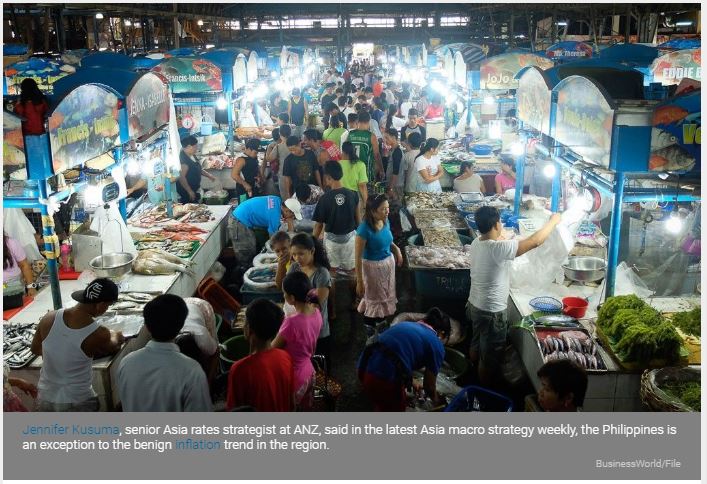Philippines: Economists see no easing in rising consumer prices
August inflation likely rose to 6%
MANILA, Philippines — Inflation last month remained elevated and likely touched the six percent mark on the back of rising oil and food prices, higher electricity rates as well as the weak peso, according to economists.
Jennifer Kusuma, senior Asia rates strategist at ANZ, said in the latest Asia macro strategy weekly, the Philippines is an exception to the benign inflation trend in the region.
“Inflation in the Philippines, due on Wednesday, is likely to remain an exception to the benign trend elsewhere. We expect it to have accelerated at the headline level,” Kusuma said.
Inflation, she added, likely reached 5.8 percent in August.
The consumer price index leapt to a fresh nine-year high of 5.7 percent in July from 5.2 percent in June due to higher oil and food prices, weak peso, and the implementation of the Tax for Acceleration and Inclusion Law.
Inflation averaged 4.5 percent in the first seven months, exceeding the two to four percent target set by the Bangko Sentral ng Pilipinas (BSP).
Based on its latest assessment, the BSP sees inflation averaging 4.9 percent this year and 3.7 percent next year.
Kusuma said ANZ sees inflation averaging 4.8 percent this year before easing to 3.8 percent next year and to 3.3percent in 2020.
She said the BSP would likely jack up interest rates by another 25 basis points this month.
The central bank has so far lifted interest rates by 100 basis points this year to rein in inflationary expectations.
It lifted benchmark rates by 25 basis points for the first time in more than three years last May 10, followed by another 25 basis points in June 20 and by 50 basis points – the biggest in 10 years – last Aug. 9.
For his part, ING Bank Asian economist Prakash Sakpal said inflation in August likely surged past the six percent mark for the first time in over a decade.
“Bad inflation data will keep the BSP on its toes, even as the currency has stabilized from a Turkish-led downturn in early August,” he said.
Sakpal said high inflation and twin-deficits have kept the peso under intense pressure this year, with a 6.6 percent year-to-date depreciation.
“The question is, will the BSP overlook the inflation data and wait for the recent 100 basis point rate hike to take effect. The current economic backdrop suggests the BSP policy tightening has further room to run,” he said.
The economist said the central bank would likely keep interest rates steady in the next rate-setting meeting scheduled on Sept. 27.
“We expect the BSP to pause at this meeting but hike again in the final quarter of the year,” Sakpal said.
The BSP’s Department of Economic Research said inflation likely averaged 5.9 percent in August amid higher price of rice and key food items due to weather disturbances and supply disruptions, increase in gasoline and LPG prices, and slight upward adjustment in electricity rates in Meralco-serviced areas.
Source: https://www.philstar.com/business/2018/09/03/1848086/economists-see-no-easing-rising-consumer-prices#y8sD6G4tZtK7Uwck.99


 Thailand
Thailand




